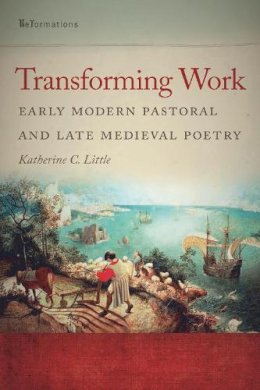7%OFF
Stock image for illustration purposes only - book cover, edition or condition may vary.
Transforming Work: Early Modern Pastoral and Late Medieval Poetry (ND ReFormations: Medieval & Early Modern)
Katherine C. Little
FREE Delivery in Ireland
Description for Transforming Work: Early Modern Pastoral and Late Medieval Poetry (ND ReFormations: Medieval & Early Modern)
Paperback. Series: Reformations: Medieval and Early Modern. Num Pages: 264 pages, Illustrations. BIC Classification: DCQ. Category: (G) General (US: Trade). Dimension: 229 x 152 x 18. Weight in Grams: 431.
Pastoral poetry has long been considered a signature Renaissance mode: originating in late sixteenth-century England via a rediscovery of classical texts, it is concerned with self-fashioning and celebrating the court. But, as Katherine C. Little demonstrates in Transforming Work: Early Modern Pastoral and Medieval Poetry, the pastoral mode is in fact indebted to medieval representations of rural labor.
Little offers a new literary history for the pastoral, arguing that the authors of the first English pastorals used rural laborers familiar from medieval texts—plowmen and shepherds—to reflect on the social, economic, and religious disruptions of the sixteenth century. In medieval writing, ... Read morethese figures were particularly associated with the reform of the individual and the social world: their work also stood for the penance and good works required of Christians, the care of the flock required of priests, and the obligations of all people to work within their social class. By the sixteenth century, this reformism had taken on a dangerous set of associations—with radical Protestantism, peasants' revolts, and complaints about agrarian capitalism. Pastoral poetry rewrites and empties out this radical potential, making the countryside safe to write about again.
Moving from William Langland’s Piers Plowman and the medieval shepherd plays, through the Piers Plowman–tradition, to Edmund Spenser’s pastorals, Little’s reconstructed literary genealogy discovers the “other” past of pastoral in the medieval and Reformation traditions of “writing rural labor.”
Show Less
Product Details
Publisher
University of Notre Dame Press
Series
Reformations: Medieval and Early Modern
Place of Publication
Notre Dame IN, United States
Shipping Time
Usually ships in 7 to 11 working days
About Katherine C. Little
Katherine C. Little is associate professor of English at the University of Colorado Boulder. She is the author of Confession and Resistance: Defining the Self in Late Medieval England (University of Notre Dame Press, 2006).
Reviews for Transforming Work: Early Modern Pastoral and Late Medieval Poetry (ND ReFormations: Medieval & Early Modern)
“Katherine C. Little’s Transforming Work is a very welcome addition to the burgeoning field of ‘trans-Reformation’ studies that place early modern literature more fully in dialogue with medieval culture.” —Modern Philology “Little offers readers a lucid and nuanced revisionist reading of the early modern pastoral’s inseparability from the medieval tradition of writing rural labour that preceded it, thereby illuminating the ... Read moresocial, political, and religious roots of a mode whose interests are often understood as primarily classist. . . the real power of Transforming Work is generated by its elaborating historical continuity for the pastoral, thereby deepening our critical comprehension of the various pressures that shaped and haunt a late medieval tradition’s early modern transformation.” —Renaissance and Reformation “In this rich, engaging new study Katherine C. Little revisits and reconceptualizes the relationship between medieval and early modern pastoral poetry through focusing on the literal and symbolic value of rural labor . . . . Little’s own labours in this book are to be commended. She has not only proposed a new framework for discussing medieval and early modern pastoral, but also presented a thesis about the genre’s ontology that will surely prompt further debate.” —Modern Language Review “Little’s argument is admirably lucid; the writing clear and focused. The case is made persuasively.” —SHARP News “This affordable, handsomely designed paperback reproduces Brueghel’s Landscape with Fall of Icarus (ca. 1558) on its cover. . . . Little writes in a straightforward, readable style. . . . Strong commercial currents flow through the painting, as they do through the literary works discussed here.” —Sixteenth Century Journal “Transforming Work is a valuable contribution not just to the study of premodern poetry and its multivalent representations of labor, but also to the growing body of work attesting to the urgent necessity of reading across the artificial medieval–early modern divide.” —Renaissance Quarterly "More germane to the arguments of Transforming Work is a larger question of how genre shapes periodization. To rethink the influences of native literary traditions on the flourishing of pastoral literature in the sixteenth century is to reimagine the contiguities of literary progression from the medieval to the Renaissance." —Times Literary Supplement "Little's purpose in this study is to revise understanding of the development of the pastoral in English literature. . . . The analysis is thorough, the findings offer an important and much-needed revision to the scholarship of the pastoral, and the style is elegant and accessible, allowing Little's clarity of thought to occupy readers' attention." —Choice "Transforming Work is an exciting, perceptive and innovative monograph which shows how poetry from the fourteenth to the sixteenth centuries represented work and labour. In doing so the book poses a serious challenge to prevailing orthodoxies, establishing a courteous dialogue with literary texts and literary critics. Katherine Little shows herself throughout to be an adept and alert reader, committed to revealing what has remained hidden for far too long, our understanding of the relationship between the major literary works of Langland, Googe, Barclay, and Spenser, the literary traditions to which their work belonged, and the reality of work in Medieval and early modern England." —Andrew Hadfield, University of Sussex "Katherine C. Little's elegant and fluidly written book offers a necessary corrective to a generic narrative that usually occludes the medieval period's contributions to pastoral. As such, her work is a welcome addition, since it both revises the Renaissance literary map and offers new contexts for reading familiar late medieval texts as part of this larger tradition." —Kellie Robertson, University of Maryland Show Less

